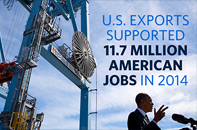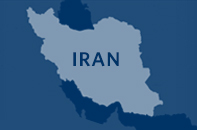What They're Saying: Environmental Advocates Point to the Trans-Pacific Partnership as a Historic Opportunity to Protect Our Oceans, Forests, and Wildlife
March 31, 2015
11:28 AM EDT
The Trans-Pacific Partnership (TPP) offers a substantial opportunity to advance American interests and values, including a once-in-a-generation chance to protect our oceans, wildlife, and the environment.
The Asia-Pacific Region and TPP parties encompass some of the world’s most ecologically significant regions, are home to major markets for wildlife and wildlife products, and include eight of the top 20 fishing nations, together accounting for a quarter of global marine catch and seafood exports. Taking action in the region is of critical importance given that five of the TPP parties are among the world’s 17 “mega-diverse” countries, a group covering less than 10 percent of the earth’s area, but supporting more than 70 percent of the earth’s species plant and animal species.
Through TPP, the Obama administration is doubling down on its commitment to use every tool possible to address the most pressing environmental challenges. We aren’t just talking about holding trading partners accountable for protecting wildlife, forests, and oceans; we plan to make those environmental commitments fully enforceable in the core of the TPP agreement, on equal footing with the economic obligations our trading partners take on.
TPP is on track to provide protections for wildlife that will commit countries to implementing, strengthening, and enforcing laws that protect threatened species, and to matching new protections with new cooperative tools that will spur and support regional action. The United States is also seeking first-ever provisions to prohibit some of the most harmful fisheries subsidies, including those that contribute to overfishing, as well as pioneering commitments by the TPP countries to combat illegal fishing, promote sustainable fisheries management, and encourage conservation of marine resources, including sharks, whales, and turtles among other threatened marine species.
In the last two months, these commitments have been front and center in both the President’s National Strategy to Combat Wildlife Trafficking and the Action Plan to implement the Task Force on Combating Illegal, Unreported, and Unregulated (IUU) Seafood Fraud. These milestone blueprints will help us lead the world in establishing verifiable, ambitious efforts to track and crack down on illegal wildlife and fishing. They also allow us to leverage global action by harnessing TPP and the power of trade as a tool to advance environmental protections. And they earned the support of some of the world’s foremost environmental NGOs and stakeholders. These leading environmental advocates affirm that if we can deliver on the commitments within reach in TPP, it may be one of the potential “game-changing solutions” to environmental issues across the Asia-Pacific region.
Here is a look at what prominent environmental advocates are saying:
The Trans-Pacific Partnership (TPP) is one of those potentially game-changing solutions. The TPP is a trade agreement designed to promote economic growth by enhancing trade and investment among twelve TPP partner countries in the Asia-Pacific region, including the United States… It's not often that large-scale opportunities arise to help protect our planet. And surprisingly enough, the TPP, if it is done right, can offer a valuable way forward.
-- Carter Roberts, World Wildlife Fund in Conserving Nature Is Good Trade Policy, February 28, 2014
TPP is a historic opportunity to advance the environmental agenda in a region of critical importance; the Pacific nations are among the most biodiverse on Earth, but overexploitation threatens the long-term prospects for their flora and fauna. We think the TPP environment chapter is headed in the right direction, and if the Administration can deliver on its commitment to use TPP to spur greater international action to combat wildlife trafficking, illegal logging and fishing, and eliminate some of the most harmful fisheries subsidies—and hold countries accountable through a binding dispute settlement mechanism—it will be an important step forward on environmental protection.
-- Priscilla Ma, World Animal Protection International; Azzedine Downes, International Fund for Animal Welfare; Mark Tercek, The Nature Conservancy, Letter to President Obama, March 16
We believe the TPP environment chapter is a critical step forward for wildlife protection. These protections are much needed because wild animals in the Asia-Pacific region are subject to illegal and unsustainable commercial exploitation. Many TPP member countries, including the United States, are major consumers of illegally-traded wildlife, including elephant ivory, rhino horn, pangolin scales, and parts and products of other threatened species. We applaud the United States for its leadership in advocating for ambitious TPP provisions to bolster wildlife protection and support biodiversity without encouraging environmental deregulation in the interest of trade and investment.
-- The Humane Society, Statement on the Trans-Pacific Partnership Agreement Environment Chapter, March 20
On the IUU Task Force Action Plan and TPP:
We are pleased to note U.S. leadership in pressing for these types of significant environmental provisions in the developing Trans-Pacific Partnership (TPP) agreement. The TPP’s environmental provisions, if structured to be strong and enforceable, offer an important tool to promote the sustainable management of nearly one-third of the world’s fisheries and to introduce measures to halt trade in illegally-taken seafood, wildlife, and timber that depletes natural resources and biodiversity in the Asia-Pacific region. U.S. leadership has been essential for advancing these issues in the negotiations. If they are included with the same rigor in the final agreement, it will represent a significant advance for the environment.
WWF and Oceana are encouraged by the IUU Seafood Fraud Task Force’s Action Plan and the proposed inclusion of strong conservation provisions in the TPP. The TPP could be a real opportunity to address issues at the heart of the destruction of the world’s fisheries and illegal wildlife trade and we look forward to seeing this potential realized through inclusion in the final agreement of the strong environmental provisions championed by the administration.
-- World Wildlife Fund--Oceana, Joint Letter to President Obama, March 20
The [IUU Task Force Action] plan lays out concrete steps that federal agencies will take to establish systems to trace seafood from point of harvest to entry in to the U.S. market, enhance enforcement, reduce fishing subsidies, and build partnerships internationally and domestically with governments and industry to employ best practices for tracking and recording seafood catches. Using powerful existing tools like enforceable environmental provisions in trade agreements such as the Trans-Pacific Partnership as well as developing new approaches like a seafood traceability system, the Administration is bringing all of its diverse resources to bear to solve this problem.
-- Bloomberg Philanthropies, Oceans blog, March 24
Markets play a critical role in driving illegal fishing and trafficking in depleted marine species, such as blue fin tuna and sharks. We applaud the Task Force’s intent to include provisions to effectively enforce environmental laws and address IUU fishing through the Trans-Pacific Partnership and other pending and future trade agreements. Taken with the other actions in the implementation plan, particularly the development of a comprehensive traceability program, we anticipate that these measures will help buyers and consumers more easily identify and reward top performers, including U.S. fisheries that lead the world in sustainable practices.
-- Margaret Spring, VP of Conservation and Science and Chief Conservation Officer, Seafood Watch (Monterey Bay Aquarium), IUU Task Force Action Plan Statement, March 16
On the Wildlife Trafficking Task Force Action Plan and TPP:
I am cheered by the whole-of-government approach announced today by the administration—including a commitment to use trade agreements and other international diplomatic pressure points, including sanctions—to force global compliance.
-- David J. Hayes, Center for American Progress, Statement, February 11
We welcome the Implementation Plan released by the Obama administration this week for the U.S. National Strategy for Combating Wildlife Trafficking … We particularly commend the news that the administration will use existing and future free trade agreements, including the Trans-Pacific Partnership (TPP) with Asia Pacific countries and the Transatlantic Trade and Investment (T-TIP) with the European Union, to combat wildlife trafficking and to enforce laws dealing with wildlife trade and conservation… Free trade agreements (FTAs) are a uniquely powerful tool that the United States can use to leverage international commitments to protect the world’s wildlife, and only with concerted global efforts of this magnitude can we truly begin to lessen the severe impacts of wildlife trafficking.
-- Priscilla Ma, U.S. Executive Director, World Animal Protection, Statement, February 12





